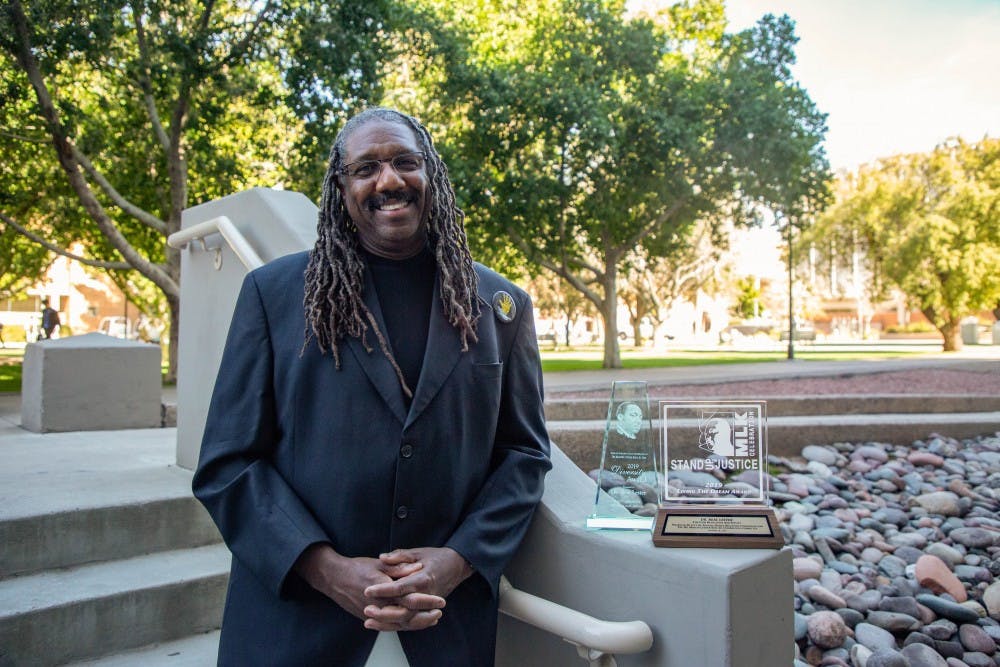For many people, Dr. Martin Luther King Jr.'s “I Have a Dream” speech is his landmark speech.
But for ASU english professor Neal Lester, a more telling moment came in the speech King gave at a visit to Stanford University in 1967 in a speech called “The Other America.”
“We shall overcome because the arc of the moral universe is long and it bends towards justice," King said in the speech.
The speech shows a complex, little-known side to the famed civil rights activist, Lester said.
“I facilitated a program back in the summer that was on the anniversary of King’s death,” Lester said. “That was an opportunity for me to try to move people, and myself, away from these sugar-coated images that idolize King.”
The program discussed King’s depression and suicidal thoughts – things that made him more human.
That event highlights the kind of work Lester does as the founding director of the award-winning Project Humanities initiative, which encourages people from diverse disciplines and communities to talk, listen and connect on what makes people human.
This month, Lester received two awards named after King: the MLK “Living the Dream” Award from the city of Phoenix on Jan. 18 and the Paradise Valley MLK 2019 Diversity Award on Jan. 21.
He said he previously received an award named after King from the city of Tempe in 2017.
For Lester, he said it is humbling to receive awards named for someone like King, who stood up for what he believed in and believed self-service to others was critical.
“I try to practice the principles that he forwarded about peace and justice and humility,” Lester said. “I’m always challenged also by trying to be better and doing better.”
Lester practices those principles daily at Project Humanities through doing “work that invites people in," including weekly homeless outreach, pop-up film screenings, discussion-based events and an annual hackathon called Hacks for Humanity. The hackathon encourages participants to create technologies to address global and local issues.
Programming runs year-round, and there can be up to 12 events per semester.
Lester said all Project Humanities honor the seven Humanity 101 principles: respect, integrity, kindness, forgiveness, compassion, empathy and self-reflection.
Vice President and Chief of Staff of ASU Enterprise Partners John Skinner has worked with Lester for several years now as a fundraiser for Project Humanities.
He said that meeting Lester has changed him for the better.
“He’s caused me to go beyond preconceived notions that I had, he’s caused me to go beyond my limited worldview and to really consider some different perspectives,” Skinner said. “I think I’m a far better human being because of Dr. Lester.”
Lester founded Project Humanities in 2010 when he noticed that students were abandoning humanities majors and minors in droves.
He said that the study of humanities has not yet found its place in society the way that STEM has.
Project Humanities Coordinator Jocelyn Ohl, who works with Lester, said that the world needs humanities now more than ever.
“Reading, writing, art and music and history ... all these things are just how we communicate with each other and how we are able to bridge gaps is the study of those things,” Ohl said. “When we disregard those things and don’t put the value on them ... it reinforces this idea that there’s not value in them.”
In between his Project Humanities programming teaching schedules, Lester found the time for recent and upcoming several research projects.
Lester wrote a book chapter on African American adaptations of fairy tales, which is intended to come out in August.
He is also finishing up the prospectus for a volume on social justice pedagogy, looking at the ways people practice social justice around the world.
He said he hopes the work will be a toolbox to help inform white allies who are unsure of how to help with issues of race, privilege and bias.
Lester was recently asked to contribute a chapter on the late poet Ntozake Shange to a volume called “Playwrights of the 1970s,” published this past fall.
In her essay titled “Justice,” Shange discussed never knowing what true justice was, as her birth certificate marked her as "colored," words which Lester said were "profound" because it points to society's contentment with flawed justice.
Lester said he is starting to recognize that justice for one is not necessarily justice for all, and sometimes justice for one is injustice for another.
“What it’s reminded me of is that justice is something to be worked towards in the same way that Dr. King’s dream is something to be worked toward,” Lester said.
Reach the reporter at Lindsay.A.Walker@asu.edu or follow @walker_writes on Twitter.
Like The State Press on Facebook and follow @statepress on Twitter.




